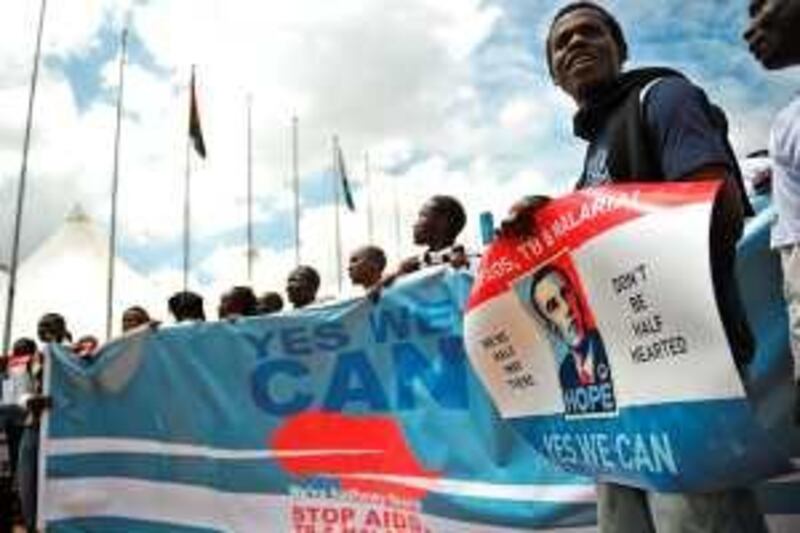NAIROBI // A year ago, as Barack Obama swept into the White House on a wave of excitement, Kenyans danced in the streets and feted their favourite son. Newspaper headlines read "Son of a Kenyan rises to the helm" and "Obama the great". Kenya declared the US election day a national holiday. Hopes were high that Mr Obama, whose father was Kenyan, would heap unprecedented attention on Kenya and Africa.
This year, however, there was no holiday commemorating Mr Obama's victory. Kenyans have stopped talking about Mr Obama as if he were a saviour. A full plate of domestic and international issues has kept Mr Obama busy, and he has spent just a fraction of his time dealing with Africa. Mr Obama's tough love for Kenyan leaders has many politicians here bristling at US policy toward its east African ally.
"The honeymoon is over," said Joshua Kivuva, a political-science professor at the University of Nairobi. "The memory of Kenyans is extremely short. One year is enough for the average Kenyan to forget that there was this president named Obama from whom they expected a lot." Mr Obama's trip to Ghana in July was the earliest first-term visit to Africa of any American president. Kenyans, however, thought he should have first visited their country, where Mr Obama's grandmother and step-siblings live.
His decision to avoid Kenya was seen as a snub to the country's leaders who have failed to enact reforms after deadly post-election violence last year. With wars in Iraq and Afghanistan and a full domestic agenda, Mr Obama was slow to craft his Africa policy. One of his big accomplishments was engaging with Sudan to help end the conflict in Darfur and steer the country away from civil war. Scott Gration, Mr Obama's Sudan envoy, has worked to keep Sudan's historic 2010 election on track.
Mr Obama has dealt with Kenya indirectly through his emissaries. Hillary Clinton, the secretary of state and highest-ranking American official to visit Kenya, told leaders here that the Obama administration was concerned at the slow pace of reforms. That message was echoed by Johnnie Carson, the top diplomat for Africa, who has shuttled in and out of Kenya delivering the country's leaders stern warnings from Mr Obama.
The latest salvo from the White House came last week when Washington said it was banning Amos Wako, the attorney general of Kenya, from travel to the United States. Washington has criticised Mr Wako for failing to tackle corruption and allowing a culture of impunity that analysts say could lead to more violence during the 2012 elections. Kenyan leaders were quick to criticise the travel ban. "It is with regret that an assistant minister of a friendly country walks into our country uninvited, makes fairly unacceptable and reckless statements and then leaves," Moses Wetangula, the foreign minister, told reporters. "It is not right."
Mr Carson sent letters to 15 high-ranking Kenyan leaders in September warning them that they could face US sanctions. Mwai Kibaki, the president, sent an official letter of protest to Mr Obama, who has not responded. Because of his special relationship with Kenya, Mr Obama's tough love for the country's leaders is the way a parent might deal with an errant child, analysts say. "The kind of pressure Obama is putting on Kenyan leaders, the fact that he is doing it in the name of reform, shows that he wants good for the country," Mr Kivuva said. "Unfortunately, it's not able to translate to something the common man would recognise."
To the average Kenyan, Mr Obama is still a hero, but he has lost some of his lustre. He was greeted by hoards of cheering Kenyans last time he visited the country in 2006, and that was when he was just a senator. Mr Obama's face still adorns minibuses and T-shirts here, but Kenyans no longer refer to him as the panacea for their problems. "I was hoping he would do more for our country," said Philip Koinange, a shop owner. "He is one of us, but it is like he has forgotten his roots."
Some have called for Kenya to fight back in its row with the US. While this amounts mostly to empty rhetoric, it is a far cry from the praises Mr Obama received last year. "Having established that America is not heaven, Kenya should match fire with fire in responding to the US government's visa ban," Kwamchetsi Makokha, a political columnist, wrote in the Daily Nation. "What would be better than to issue Mr Obama with a ban?" he added. "Knowing his connection to Kenya, and the stirring of his heart whenever he thinks of Kogelo, his father's ancestral home, denying him access to his psychological umbilical cord would devastate him."
mbrown@thenational.ae





